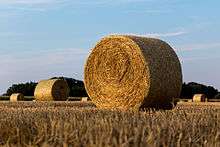Definify.com
Webster 1913 Edition
Bale
Bale
Bale
,Bale
Webster 1828 Edition
Bale
BALE
, n.[Heb. to bind, to pledge, and its derivative.]BALE
,BALE
,Definition 2026
Bale
bale
bale
English
Noun
bale (uncountable)
- Evil, especially considered as an active force for destruction or death.
- Suffering, woe, torment.
- 1596, Edmund Spenser, The Faerie Queene, VI.7:
- That other swayne, like ashes deadly pale, / Lay in the lap of death, rewing his wretched bale.
- 1596, Edmund Spenser, The Faerie Queene, VI.7:
Derived terms
Etymology 2
Form Old English bǣl, from Proto-Germanic *bēlō, from Proto-Indo-European. Cognate with Old Norse bál (which may have been the direct source for the English word).
Noun
bale (plural bales)
- (obsolete) A large fire, a conflagration or bonfire.
- (archaic) A funeral pyre.
- (archaic) A beacon-fire.
Derived terms
Etymology 3
Precise derivation uncertain: perhaps from Old French bale, balle, from Medieval Latin balla (“ball, rounded package”), from Germanic; or perhaps from Dutch baal, itself borrowed from French.

Noun
bale (plural bales)
- A rounded bundle or package of goods in a cloth cover, and corded for storage or transportation.
- A bundle of compressed wool or hay, compacted for shipping and handling.
- A measurement of hay equal to 10 flakes. Approximately 70-90 lbs (32-41 kg).
- A measurement of paper equal to 10 reams.
Derived terms
Translations
Coordinate terms
See also
-
 Units of paper quantity on Wikipedia.Wikipedia
Units of paper quantity on Wikipedia.Wikipedia
Verb
bale (third-person singular simple present bales, present participle baling, simple past and past participle baled)
- (transitive) To wrap into a bale.
Translations
Etymology 4
Alternative spelling of bail
Verb
bale (third-person singular simple present bales, present participle baling, simple past and past participle baled)
Translations
See also
-
 Bale in the 1911 Encyclopædia Britannica.
Bale in the 1911 Encyclopædia Britannica.
Anagrams
French
Alternate forms
Etymology
From Gaulish *balu.
Pronunciation
- IPA(key): /bal/
Noun
bale f (uncountable)
- chaff (inedible casing of a grain seed)
Kapampangan
Etymology
From Proto-Philippine *balay, from Proto-Malayo-Polynesian *balay, from Proto-Austronesian *balay.
Noun
bale
Portuguese
Pronunciation
Verb
bale
- first-person singular (eu) present subjunctive of balar
- third-person singular (ele and ela, also used with você and others) present subjunctive of balar
- third-person singular (você) affirmative imperative of balar
- third-person singular (você) negative imperative of balar
- third-person singular (ele and ela, also used with você and others) present indicative of balir
- second-person singular (tu, sometimes used with você) affirmative imperative of balir
Romanian
Etymology
From Latin root *baba. Compare French bave, Italian bava, Spanish and Portuguese baba. The normal result, *ba, is not used as the singular has been replaced with bală through analogy.
Noun
bale f pl (plural only)
Declension
| plural | ||
|---|---|---|
| f gender | indefinite articulation | definite articulation |
| nominative/accusative | (niște) bale | balele |
| genitive/dative | (unor) bale | balelor |
Derived terms
- bălos
Synonyms
Spanish
Verb
bale
- Formal second-person singular (usted) imperative form of balar.
- First-person singular (yo) present subjunctive form of balar.
- Formal second-person singular (usted) present subjunctive form of balar.
- Third-person singular (él, ella, also used with usted?) present subjunctive form of balar.